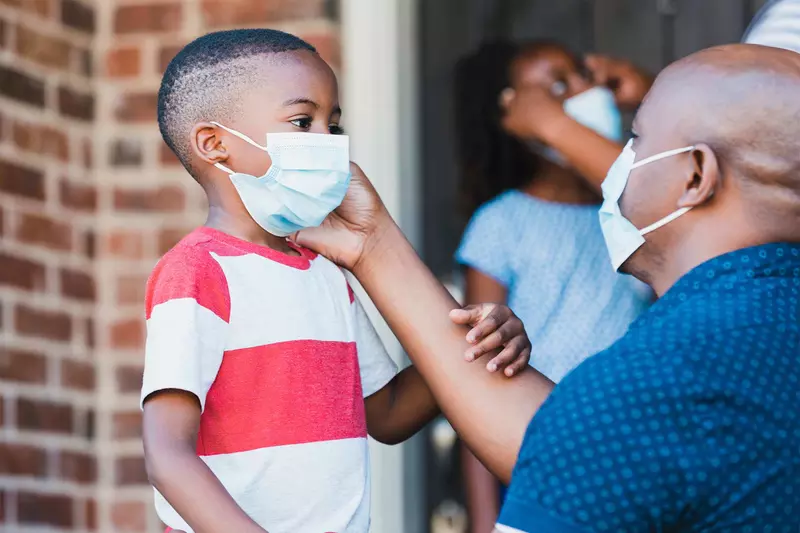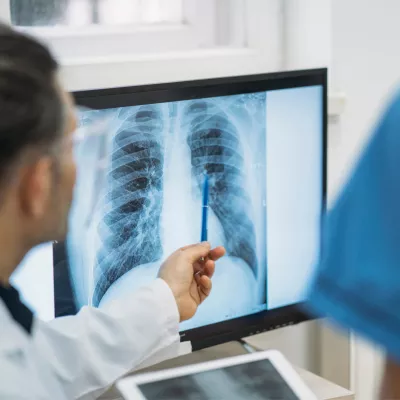- AdventHealth

With coronavirus vaccines being approved and distributed per the Centers for Disease Control and Prevention (CDC) guidelines, we’re turning a corner and looking forward to better days ahead — a point emphasized by Alric V. Simmonds Jr., MD, AdventHealth General Surgeon, Chief Health Equity Officer and Chief Medical Officer.
Coronavirus vaccines from pharmaceutical companies Moderna and Pfizer have shown strong promise in protecting against COVID-19 in clinical trials, with Moderna being 94.5% effective and Pfizer 95% effective. Front-line health care workers and older adults have already started receiving both the Pfizer and Moderna vaccines across the country as part of the initial phases of the CDC’s distribution plan.
What’s the Difference Between the Moderna and Pfizer Vaccines?
While both vaccines are over 94% effective, their clinical trials have been slightly different. Pfizer’s vaccine prevented coronavirus in all but eight of the 18,198 study participants who were tracked for about two months after receiving the second dose of the vaccine.
With the Moderna vaccine, on the other hand, five of the 13,934 study participants developed coronavirus after being tracked for about seven weeks after their second dose.
Vaccines from both companies have been effective in older adults, but Moderna was 100% effective in participants age 65 and older, while Pfizer was 93.7% effective in those age 56 and older.
The Most Important Takeaway: The Vaccine Is a Breakthrough
AdventHealth experts agree that both the Pfizer and Moderna COVID-19 vaccines are safe and effective, and we have already started giving vaccinations to health care personnel and older adults.
We are distributing both the Pfizer and Moderna vaccines, depending on availability. “It’s an important step in us recovering from COVID-19. It’s a wonderful medical breakthrough and it’s a historical moment that I’m happy to be a part of,” Dr. Simmonds says of the vaccine.
There have been reports of certain side effects being linked to the vaccine, but neither company’s vaccines have caused issues that would prevent emergency use authorization from the FDA.
Coronavirus Vaccine Side Effects
So far, the most common side effect reported from people who have received the vaccine is an injection-site reaction. The Pfizer vaccine is administered in two doses, three weeks apart, and many of the side effects reported were after people got the second dose.
In a document submitted by Pfizer to the FDA, it was reported that coronavirus vaccine side effects included:
- An injection-site reaction (84% of people had this)
- Fatigue (63% of people had this)
- Headache (55% of people had this)
- Muscle pain (38% of people had this)
- Fever (14% of people had this)
- Chills (lesser-reported side effect)
- Upset stomach (lesser-reported side effect)
Vaccine Side Effects Mean Your Immune System’s Working
Overall, the vaccine side effects may cause some discomfort, but that’s actually a result of the immune response brought on by a vaccine. Many vaccines, including the flu shot, give some people mild symptoms.
“Vaccinations help populations of people survive grave illnesses,” Dr. Simmonds explains. “If you’ve gone to school or if you’ve played team sports, you’ve been vaccinated for measles, mumps, chickenpox and other illnesses. Our bodies tolerate these things very well and they keep us safe.”
The Bottom Line: Mild Side Effects Are Normal and Will Pass
Moderate vaccine side effects, such as headache and fatigue, are not a cause for alarm. Whether you do get side effects after the first dose or not (both scenarios are considered normal), the second dose is still needed to protect against COVID-19.
From what we know so far, these coronavirus vaccine side effects are temporary, and shouldn’t discourage anyone from getting this potentially life-saving immunization.
“I understand why some people aren’t sure, but please don’t let your fear prevent you from taking a vaccination that will save you,” says Dr. Simmonds. “If you do, you may end up like many of the patients who are in my ICU now, people whose families cannot be with them when they’re taking their last breath. Over 300,000 Americans, largely people who are brown and Latinx, have died of this disease. So, make the right choice, roll up your sleeve and get the shot.”
Sign Up for Coronavirus Vaccine Alerts
We are following the current vaccine distribution guidelines from the CDC and state governments. When the coronavirus vaccine is available to you, you’ll be able to schedule an appointment. For more information about when the vaccine will be available for you, we encourage you to sign up for email alerts at www.CoronavirusVaccineAlerts.com.


